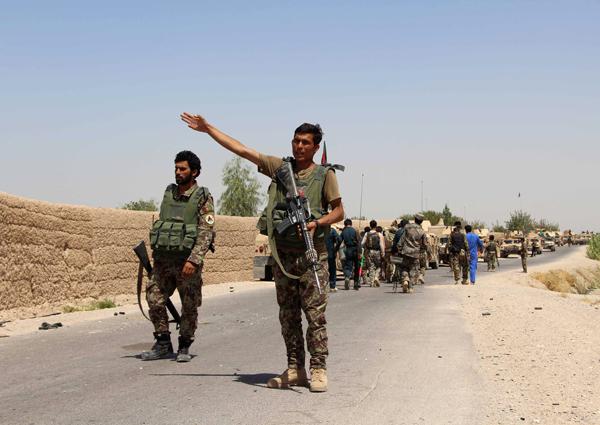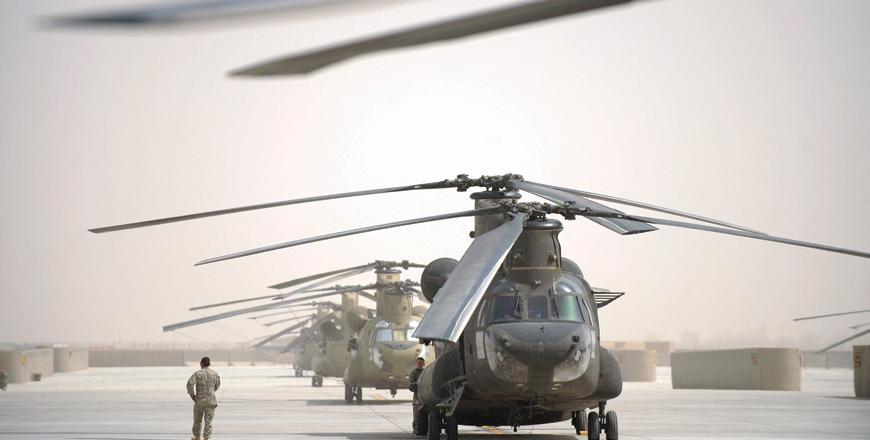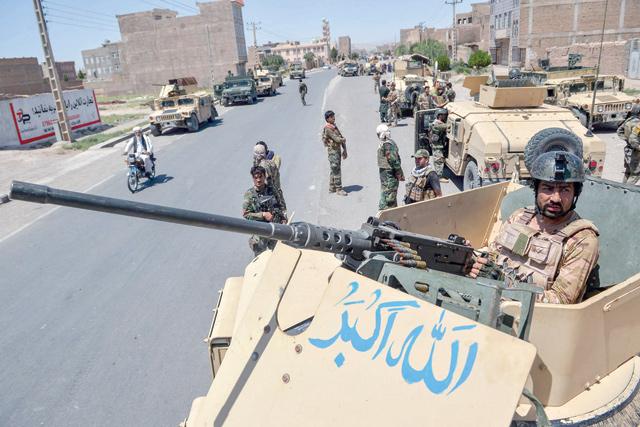You are here
Insecurity and opium blight Afghan province as British troops leave
By AFP - Oct 27,2014 - Last updated at Oct 27,2014
KANDAHAR, Afghanistan — Despite high praise from politicians, British troops ending their combat mission in Afghanistan's Helmand are leaving behind a province still blighted by insurgency and a huge opium harvest.
The last 400 or so British troops were airlifted from Camp Bastion to Kandahar on Monday in preparation for a flight home, ending a mission that lasted longer than World War II and cost 453 lives.
A similar number of US Marines were flown from the adjacent Camp Leatherneck to Kandahar, from where they will soon depart for the US.
US and British troops have been in Afghanistan since the 2001 US-led invasion which ousted the Taliban government in Kabul.
When the British took over command in the southern province of Helmand in 2006, there were hopes they could employ a softer approach than their US counterparts — and win hearts and minds in the stronghold of Taliban insurgents battling to regain power.
Their mission was hailed Sunday by British Prime Minister David Cameron and senior local Afghan officials as a success that lays solid foundations for NATO's post-2014 training and support mission.
Cameron said troops could be "proud of all they have achieved to keep us safe".
But while the Afghan National Army has been strengthened by billions of dollars of aid and Western training, some analysts warn that a lack of strategic foresight means the British have left with their mission uncompleted.
Chief among the concerns is the growing menace of opium production, which helps sustain the insurgency.
Afghan poppy production hit an all-time high last year as farmers sought to "insure" themselves before the withdrawal of NATO combat forces by the end of this year.
Cultivation nationwide amounted to 207,000 hectares in 2013 — far outstripping the previous record of 193,000 hectares in 2007 and with Helmand accounting for 48 per cent, according to the United Nations Office on Drugs and Crime (UNODC).
"Farmers may have driven up cultivation... trying to shore up their assets as insurance against an uncertain future," a UNODC report said.
Missed opportunities
Helmand has seen some of the fiercest fighting of the war.
Despite a mixture of peace deals and major pushes undertaken with US allies, coalition forces failed significantly to dent the insurgents, who this year have redoubled their efforts — killing 7,000-9,000 Afghan security forces nationwide.
A report by the respected Afghan Analysts Network in July detailed how a series of mis-steps allowed one district of Helmand to sink further into the hands of the insurgents.
It said the district's "shadow governor", Taliban commander Mullah Abdul Qayum, was on the verge of switching sides in 2010 because he was incensed by the insurgents' brutality.
But after months of secret communication with Afghan and British officials, Qayum and his entourage were bombed by US forces who hailed it as a triumph.
The report also criticised the British-led Provincial Reconstruction Team for failing to deliver development projects that would have been a sign of good faith to Taliban commanders who had reined in violence, and subsequently allowing the fighting to return.
"It was unfortunate that, although the coalition subscribed in public to the idea that the war in Afghanistan could only be resolved politically, military expediency usually trumped political necessity in practice," it said.
Taliban pushback
Brigadier-General Robert Thomson, the highest-ranking officer with the British forces, said he felt the time was right to hand over.
"We look back with pride because the Afghans are ready to pick up the baton. They've been in the lead already since May 2013 and they've done well. But there remain some challenges in security and government," he told AFP.
US General John Campbell, commander of ISAF forces, offered an equally sanguine assessment.
"Helmand as you know has been a very tough area, and a very tough last couple of months. Those were very tough to the Afghan security forces as they continue to grow their capacities," he said.
"In Afghanistan it's always going to be a country that's going to have security-type issues."
Some 20 planes and helicopters were involved in the 24-hour evacuation operation, moving back and forth between the two bases.
Many ordinary troops spoke of a job well done.
But on the ground, some locals are fiercely critical about the British record in Helmand, drawing parallels with their ill-fated 19th-century colonial adventures.
"The British troops have been defeated the second time in Helmand, the first time they were beaten almost a hundred years ago," said Mohammad Ismail, a farmer from Helmand's Musa Qala district.
"Now they are fleeing Helmand province. The Taliban are making progress and gaining ground, hundreds of their soldiers were killed and thousands were left wounded, but they are hiding the reality. It was a failed mission for them in Helmand."
Related Articles
KANDAHAR, Afghanistan — Fighting raged Thursday in Helmand after Afghanistan rushed military reinforcements to beat back Taliban insurgents
KANDAHAR, Afghanistan — Fighting between the Taliban and Afghan government forces resumed Sunday in the restive southern province of Helmand
KANDAHAR, Afghanistan — Afghan forces battled to stop a first major city from falling to the Taliban on Monday as the United States and Brit


















